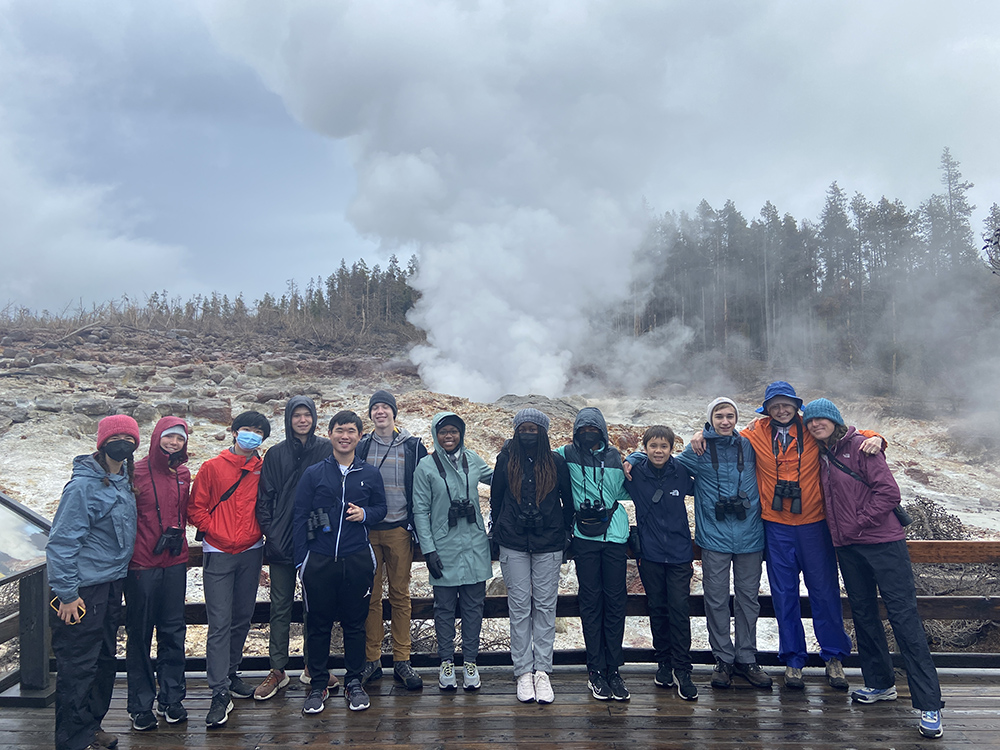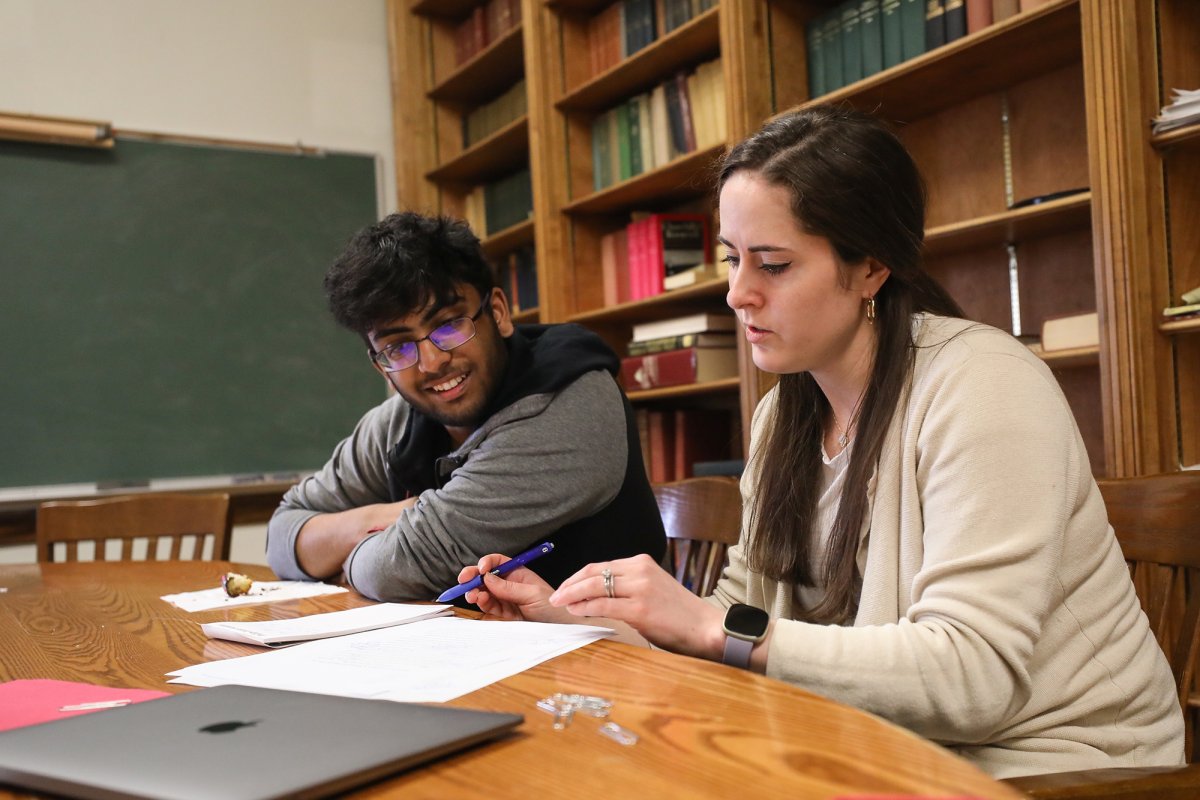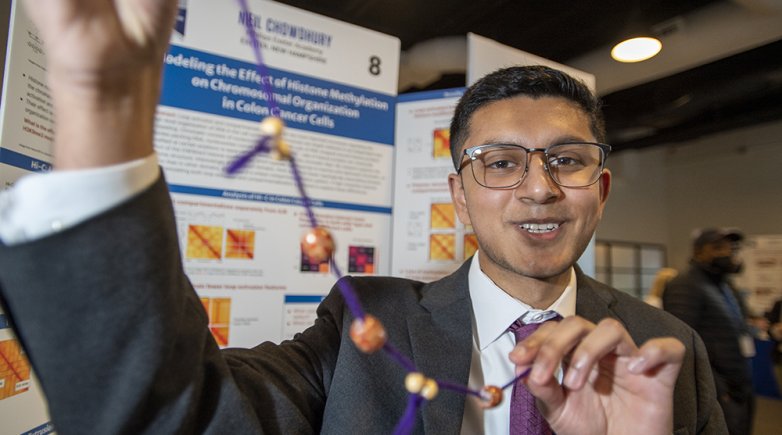We are wiser, stronger, but most importantly, we've built a family of lifelong friends this early on in life. That is truly a rare thing."Bona Yoo '22, senior class president
'You are ready': Class of 2022 graduates in style
Dazzling sunshine bathed campus Sunday as Exeter celebrated its commencement ceremony on the front lawn of the Academy Building for the first time since 2019. The 312 members of the class of 2022 joined in a procession that began on the south side of campus, crossing Front Street to take their seats in front of a proud and excited audience of their teachers, family and friends.
After welcoming and expressing gratitude to faculty, staff and family members, President of the Senior Class Bona Yoo kicked off the ceremony by inviting her classmates to remember their younger selves, and to reflect on how far they had come.
>> Watch the full graduation ceremony
“We took this crazy bet on ourselves, picked up our bags, left everything we knew and congregated from all corners of the world to live together in Exeter, New Hampshire,” Yoo said. “We had to start from scratch and build with what we had, and what we had was each other.”
In addition to revisiting some “snapshots of bliss” — from a sunrise walk with her roommate to celebrating the first football win over Andover in eight years this past fall — Yoo also acknowledged the “gut-wrenching lows” she and her classmates endured together, particularly the upheaval caused by the COVID-19 pandemic.
“For the past two years, we’ve been fighting pretty hard to stay connected and to keep our traditions alive,” she said. “We learned how to connect and to stay resilient. We stunned each other with our talents, our capacities to listen and our ability to challenge one another’s values and notions.”
“We are wiser, stronger, but most importantly, we’ve built a family of lifelong friends this early on in life,” Yoo concluded. “That is truly a rare thing. Because we tend to be inherently self-critical, and because we’re always striving for more … it’s imperative that we celebrate ourselves not just today on grad day, but also tomorrow, and on your good days and on your bad ones.”
Principal’s farewell address
Principal William K. Rawson ’71; P ’08 began his farewell message to the seniors by noting the special connection between himself and the class of 2022. “Your first Assembly was my first Assembly,” he said. “You were nervous and excited preps [and] I was your nervous and excited new principal.”
Rawson lauded the students’ accomplishments and pursuit of excellence in the classroom, the arts and athletics, as well as how they had worked to make the school a more equitable and inclusive community, among other contributions. “I also admire the way you have cared for and supported each other,” he continued. “You care deeply for each other. You always show up for each other. In doing so, you have set a powerful example for the classes that will follow.”
Rawson repeatedly drew parallels to his own graduation from Exeter 51 years earlier, at one point sharing a quote from a speech made on that day by his classmate Roberto Garcia ’71. Rawson echoed Garcia’s statement of optimism and purpose, and his emphasis on the important of “human connections” when it came to making a difference in the world.
“You are ready to take your place in the world and follow the examples of generations of Exonians who have come before,” Rawson said. “You are ready to be the kinds of citizens and leaders that our world needs — citizens and leaders who will act with empathy, understanding and respect for their fellow human beings … and who will work together to break patterns of injustice and form a better world.”
You are ready to be the kinds of citizens and leaders that our world needs."Principal Bill Rawson '71
Honors and Special Awards
In addition to Yoo’s and Rawson’s speeches, Dean of Faculty Ellen Wolff P’17 and President of the Trustees Morgan C.W. Sze ’83; P’19, P’22, P’25 presented various graduating seniors with this year’s endowed college scholarships, as well as a number of special awards and prizes:
The Faculty Prize for Academic Excellence: Audrey Aslani-Far
The Cox Medals: Audrey Aslani-Far, Emma Finn, Valentina Kafati, Bona Yoo, Felix Zou
The Yale Cup: Aiden Silvestri
The Ruth and Paul Sadler ’23 Cup: Kate Mautz
The Perry Cup: KG Buckham-White
The Williams Cup: Neil Chowdhury, Emma Finn
The Eskie Clark Award: Anne Chen
The Thomas H. Cornell Award: Dorothy Baker
The Multicultural Leadership Prize: Zara Ahmed, Adam Belew, Mali Rauch, Marina Williams
Ceremony program
A string quartet comprised of seniors Sava Thurber (violin), Aaron Venzon (viola) and Josephine Elting (cello), and upper Jesalina Phan (violin) played before the ceremony and during the processional.
Seated onstage with Rawson during the graduation ceremony were retiring faculty members Kirsten Russell and Ralph Sneeden. Peter Vorkink, Gordon Coole and Viviana Santos are also retiring this year.
Rawson’s speech was preceded by a performance of “The Road Home,” composed by Stephen Paulus, by the seniors of Exeter’s Concert Choir: Moksha Akil, Kiesse Nanor, Nicholas Talleri, Otto Do, Garrett Paik, Catherine Uwakwe, Alexander Luque, Aryana Ramos-Vasquez, Narmana Vale, Jacqueline Luque, Isaac Saunders, William Whitney and Daniel Zhang.
Finally, seniors Neil Chowdhury and Grace Emmick assisted Rawson in handing out diplomas to their classmates. The ceremony was followed by a luncheon on the lawn in front of the Class of 1945 Library for graduates and their guests.
A return to tradition
The tradition of holding graduation on the Academy Building lawn began in 1983 and continued until the pandemic’s arrival caused the in-person ceremony to be canceled in 2020. Last year, the class of 2021 returned to celebrating their graduation in person, but the ceremony was held in Phelps Stadium to accommodate social distancing and other health and safety protocols.















